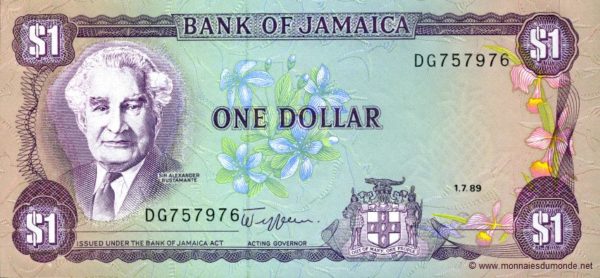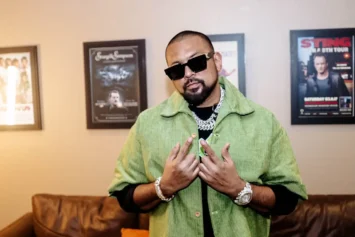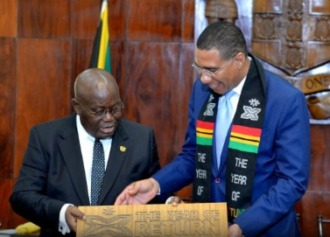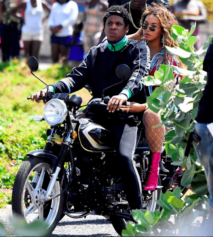
Against the backdrop of the 130th anniversary of Sir Alexander’s birth, commemorated by the opposition party on Feb. 24, Ewart ‘Fats’ Walters said Jamaica would have been much further ahead if Bustamante had not split from the People’s National Party (PNP) and damaged the national movement.
“Jamaica could have been much further ahead now, had William Alexander Bustamante remained as a supporter of the national movement in which Norman Manley’s People’s National Party played a major role, and not the adversary he became,” Walters wrote in the prologue to his latest book, We Come From Jamaica – The National Movement 1937-1962, 2014.
Walters said that many Jamaicans had recognized that the two-party system divided the country and fractured the national unity that attended the discussions and activities that began in the late 1930s. The Westminster system of government, derived from the British, created an artificial fractiousness that left the losing party to “oppose, oppose, oppose” regardless, he argued.
“The exciting spirit of creativity, volunteerism and togetherness that was fomented by the movement towards nationhood was blunted the moment in 1943 that Bustamante was persuaded by the British to keep Manley in check by forming his Jamaica Labour Party,” Walters said.
Walters, who is remembered for the time when he was deputy editor of the now defunct Jamaica Daily News, also quoted another author, Obika Gray, who wrote Demeaned but Empowered, blaming Bustamante for the introduction of political violence in Jamaica.
“Bustamante unabashedly identified himself with the use of force … violent skirmishes and was a practitioner of the disruptive uses of violence to turn back political challenge,” Gray was quoted by Walters as saying.
Walters suggested that a call by civil society for a government of national unity in 2010 “was really an attempt to shed partisan politics and reunite the people — even if it would mean playing down the political parties — and complete the task of nation building.” Walters was a top Jamaican journalist who worked for Public Opinion founded in 1937, The Gleaner, and the Jamaica Daily News.
He spent six years in the Jamaican diplomatic service in Ottawa and New York before migrating to Canada where he founded Spectrum community newspaper. In 2010, he was invested with the Order of Distinction, Commander Class for his voluntary work in defending and promoting minorities in Canada.
He plans to launch We Come From Jamaica – The National Movement 1937- 1962, 2014, his third book, in Ottawa, Toronto and in Jamaica between March and May this year. In the book now on the press, Walters described the national movement as a creative phenomenon between 1937 and 1962, the year Jamaica secured its independence from Britain, saying that like many movements, it was not registered or formalized in any way.
“There will undoubtedly be discussion and claims about a drive towards nationhood that began earlier, but the activities of 1937 marked a specific impetus that bore fruit — even as it built on previous activities and deliberations. The goal of the movement was unity — national unity.
“Slavery had created two distinct streams in the populace, but this showed no sign of changing after the slaves were freed. In addition, the people were divided by skin color, which also meant unequal wealth; at one level there were the whites who owned and controlled everything, and at the other the blacks who eked out a living on the margins.
“The two Jamaicas — one oriented toward Europe, the other toward Africa — operated in symbiotic relationship during the 19th century.
“The two Jamaicas are also evident in the music. ‘High-culture’ Jamaica oscillated around Chopin, Brahms, Beethoven and English, Scottish and Welsh melodies — music without the drum.
“Low-culture Jamaica produced its own music with its own rhythms, and lyrics that either poked fun at situations or at the oppressors, or expressed deep-seated yearnings for improvement in the people’s conditions… It promoted an enduring ambivalence that eventually became essentially Jamaican.”
Later, this ambivalence was to take on new life in partisan politics, he wrote. He said that it was the island-wide strikes of the people themselves in 1938 that became “the launch-pad from which Bustamante propelled himself as czar of the trade union movement.”
Walters added: “The unions played a seminal role in the creation of the Jamaica we know, and so did the political parties.
“Nevertheless, it was in the emerging trade unions, rather than the political parties, that fractiousness, followed by political violence, first showed its ugly face. Bustamante unabashedly identified himself with the use of force… violent skirmishes, and was a practitioner of the disruptive uses of violence to turn back political challenge.
“Supporters of the PNP in the early 1940s were afraid to walk the streets of downtown Kingston as this was the domain of the BITU longshoremen who, identifying them by their attire, often attacked them — anyone who dressed nicely was seen as a PNP supporter. PNP rallies in Kingston were often stoned and the party consequently moved its meetings and rallies out of downtown Kingston and up above the border with St Andrew at Torrington Bridge, to Edelweiss Park, which was Marcus Garvey’s former headquarters,” Walters said.
“This class divergence between the parties was to continue for 30 years until Michael Manley, himself a trade union leader, was voted in as president of the PNP.
Read the full story at jamaicaobserver.com


